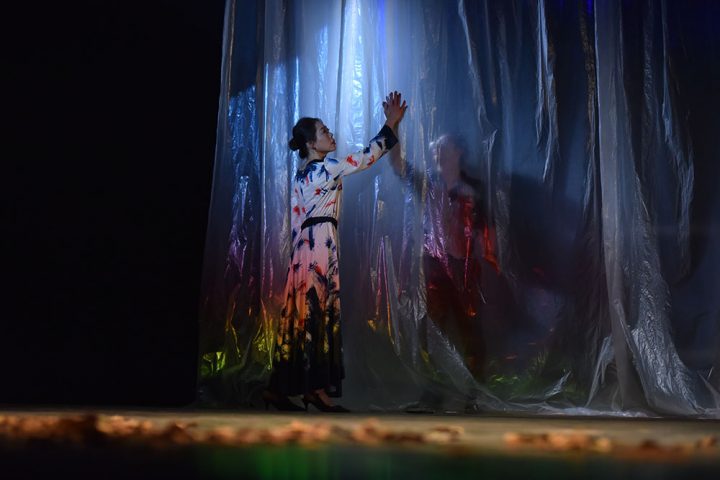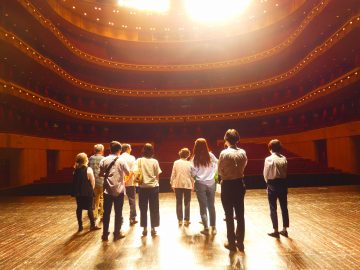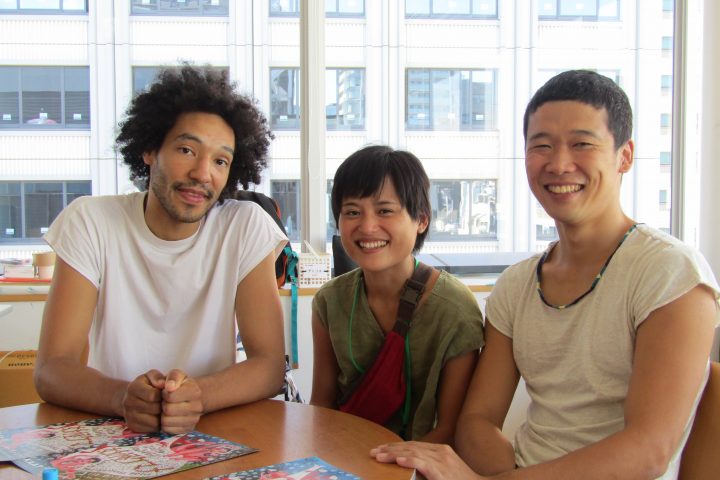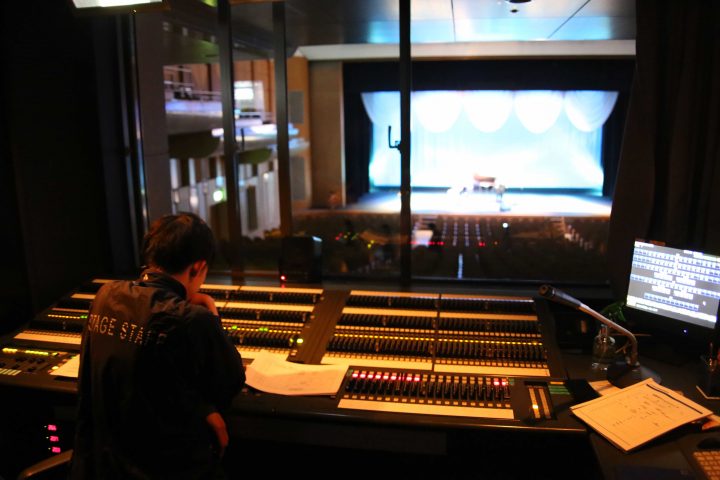Kanagawa・Standing Bar Culture Talk Vol.5 "Boundaries and Exchange"
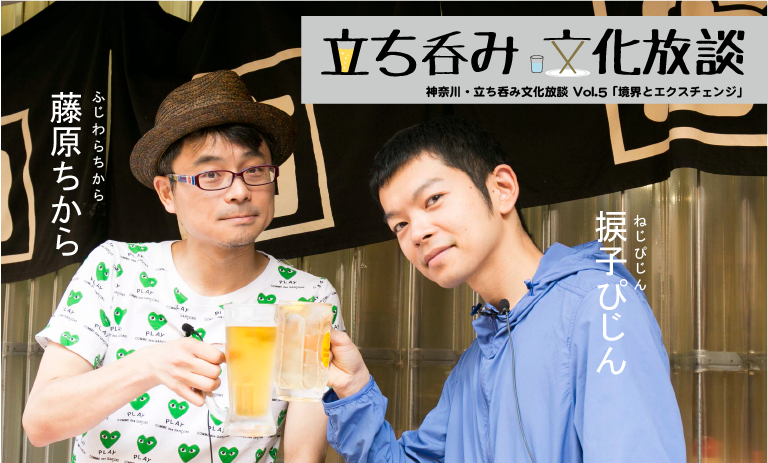
2015.5.8 TEXT: Akiko Inoue PHOTO: Masamasa Nishino
Chikara FUJIWARA
Editor, critic, and founder of BricolaQ. Born in Kochi City in 1977. Moved to Tokyo at the age of 12 and began living alone there. Moved around a lot after that, worked for a publishing company before going freelance. Edited Musashino Art University's newsletter "mauleaf" and Setagaya Public Theater's "CaroMag". Co-edited with Tsujimoto Chikara "Book Guide to Architecture" (Meigetsudo Shoten). Co-authored with Tokunaga Kyoko "The Strongest Engeki Theory" (Asuka Shinsha). Currently lives in Yokohama. Member of Theatre Center F. Also creates "Engeki Quests" in various locations, where participants stroll around cities and peninsulas with gamebooks in hand.
Pijin NEJI
Born in Akita Prefecture in 1980. From 2000 to 2004, he was a member of Dairakudakan and studied under Akaji Maro. Based on the unique physicality he developed through Butoh, he presents solo dance pieces that take a microscopic approach to his own body, as well as choreographic pieces that treat the body as a materiality. In recent years, he has been observing the systems that give birth to song and dance, and extracting elements accumulated in individuals' bodies and lives, attempting to invent contemporary dance as a folk art form for the modern city. In 2011, he won the Yokohama Dance Collection EX Jury Prize and the Festival/Tokyo Open Program F/T Award. He has performed in works by Joseph Nagy, FAIFAI, ASA-CHANG & Junrei, Okada Toshiki, and others.

This time, we welcome dancer and choreographer Nejiko Pijin for a chat at Shimoda Shoten, a standing bar just a two-minute walk from Tsunashima Station. Our host, Fujiwara Chikara, rushed over to join us the day after returning from a residency in Manila. Nejiko was concerned when Fujiwara's face was purple when they met, but it turns out that she herself had an upset stomach after completing a research trip from Kyoto to Korea to Fukuoka. The theme of Vol. 5 of the standing bar culture chat brought to you by these two in such poor health is "Boundaries and Exchange."
Fujiwara Chikara (hereinafter Fujiwara) : Wow, it really feels like Japan is inside an air-conditioned room.
Nejiko Pijin (hereinafter Nejiko) : It's quite hot today.
Fujiwara : Today's theme is about you crossing the boundaries between dance and theater, and you also travel between Korea and Japan, so you have the image of "borders". Also, when you cross countries or borders, you try to survive by exchanging something, like exchanging currency. I set this up because I wanted to ask you what you think about such borders and exchanges.
Nejiko : First of all, speaking of "boundaries," Chikara-san seems to be not feeling his best after coming back from Manila, but I've had stomach problems for a week now... I've seen a lot of different things in Korea and Kyoto, but I'm not digesting the information properly. I saw contemporary art in Kyoto and the Miryang Arirang Festival in Korea, and on the way I stopped in Fukuoka to see my friend, the dancer Natsuko Tezuka, but that night I developed a high fever and threw everything I had stored up until then down the toilet. So for the past week, I've been living in a state where there are no boundaries between my internal organs. Today I'm going to eat pickled vegetables, take lactic acid bacteria, and talk while segmenting my internal organs little by little.
Fujiwara : I see (laughs)
Well, shall we have a toast for now?
Nejiko : That's right.
Cheers~!
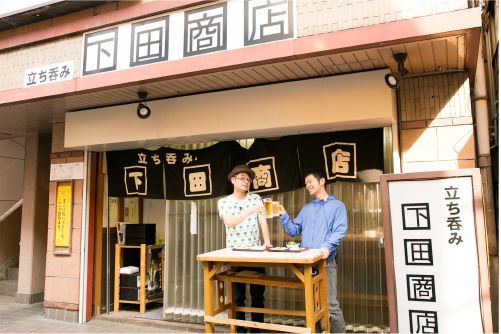
Fujiwara : Even so, traveling is quite tiring.
Nejiko : I'm the kind of person who can only see what's in front of me, so when I'm working on a residency in another place, I can't think about Tokyo. I'm currently creating works based in Tokyo, but I haven't been able to bring back what I did in Korea and make use of it in Tokyo.
Fujiwara : I'm in the exact same situation. While I was in Manila, I didn't really feel like watching the Japanese news.
Nejiko : So for now, let's enjoy Tsunashima here.
Fujiwara : That's true (laughs).


Shimoda Shoten is a stand-up bar where there are trays placed right at the entrance where you put what you want to eat on and take it to the register.
When you order at the deli counter in the back, the staff will heat up the side dishes for you.
If yakitori or fried foods are not on the table or in the refrigerator, they will be cooked and brought to you after you order.
Nejiko : I've been talking about illnesses since the beginning, but when I was in Busan last June for a residency, I got urethritis due to stress. I feel like people in Busan are always with someone and have a loose boundary between themselves and others. Even when I wanted to think alone, someone would come into my room in broken Japanese and ask, "Who's your favorite AKB member?" It was quite painful. That made me aware of the boundary between myself and others, and I thought that dance is an artificial technique for me to eliminate my own boundaries. I realized that I enjoy dance as a way to serve the place, to get involved in the movement, and to become someone other than myself.
Fujiwara : Ah, I think I understand a little bit. There were people from Australia and America who came to Manila, and they were all very sociable, so for example, if I was working alone in a cafe, they would always talk to me. It felt natural. And Filipinos, they love to talk, so they would talk to me (laughs). But when I got sick, I didn't want to speak English anymore, I just wanted to be left alone...
Nejiko : What do you call English with a Filipino accent? Filipino-glish?
Fujiwara : There are more than 7100 islands in the Philippines and apparently there are 172 native languages, but Tagalog is the language used in Manila. That Tagalog accent in English is called Taglish. Compared to the Australian accent, the English of people who use Taglish is very easy to understand. English is the official language in the Philippines, but since it is not their native language, it seems that they become a bit formal when they speak English. Apparently, this condition often becomes difficult, and is called English panic.
Well, shall we go for a second drink now?
Nejiko : That's great. I was curious about something called Gari Highball...
Fujiwara : Then I'll have oolong tea.

"Gari Highball" is a highball topped with pickled ginger
Nejiko : Oh! So that's what "gari" means! I thought it was a strong, crunchy highball (laughs).
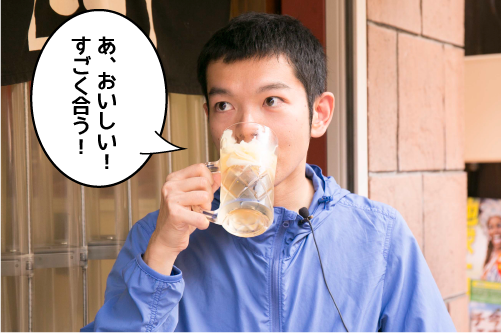
On accents - Tatsumi Hijikata and Shuji Terayama
Fujiwara : Continuing on from what I said earlier, Filipinos are very good at English, due to national policy. In other words, it feels like they always have more than one language. That's amazing, isn't it?
Nejiko : You're from Kochi, right? Is Tosa dialect completely different from standard Japanese?
Fujiwara : Ah, they are completely different. What about Akita dialect and standard Japanese?
Nejiko : Apparently, it shows up in my intonation at the slightest moment. For example, "ka-" becomes "nga-". But while it's easy to distinguish between accent and standard Japanese, in reality the accent comes first and standard Japanese comes later, so it's a strange way of expressing it (laughs).
Fujiwara : That's true. By the way, you previously pointed out that the accent of the butoh dancer Tatsumi Hijikata, who is from Akita like you, was the speech of someone who had lost his accent.
Nejiko : Yes. I think Hijikata was a person who actively incorporated Tohoku. He was a very smart person with a background in modern dance, and he created a completely new term called "Butoh." It was a great invention, and I think he really thought it through and made a breakthrough.
Speaking of dialects, the condolence gift given to Hijikata at his funeral was a record of him speaking. A company made a CD of it, and it is now sold at a fairly high price. When I listened to it, I thought, "Oh, this is the Akita dialect being composed." Personally, I was able to distance myself from Hijikata, who I had deified until then, and it was an opportunity for me to think that it was okay to create something original, rather than just doing "Butoh."
Fujiwara : I see. By the way, what about Terayama Shuji, who is also from the Tohoku region?
Nejiko : I don't think Terayama's accent is something he's made up. It is easier to understand than the locals, but
I feel like that's different from Hijikata-san's manipulation. I really like the way he moves his body and the way he speaks, which is a mix of Tsugaru accents.
Fujiwara : This may be related to today's theme "exchange," but when you are in a place, you absorb a lot of things, and talking to the people around you influences your language to some extent, right? It's interesting to think that traces of various places remain within each individual.
Theatre as a medium
Nejiko : The reason Chikara went to Manila this time was to do a residency production for Engeki Quest, right?
Fujiwara : Yes. After TPAM2015, I was invited by the director there to participate in a young festival called KARANABAL2015. In fact, this festival is a three-year project. This year is the first year, so I focused on research and presented a short piece that I put together using footage I had taken every day in Manila and stories I had interviewed there.
Nejiko : Wow, by the way, what was the initial inspiration for Engeki Quest?
Fujiwara : It all started with a request from the art space BlanClass in Idogaya. They said, "Why don't you try something?" (laughs). When I was little, I used to read a lot of game books, so I thought it might be fun to do it outside. But there are security issues in Manila, so I thought I probably couldn't do the same thing, so I thought it would be nice to see the city, meet people, listen to their stories, and then put it together from there. That's why I'm not particular about the format.
So, I don't know if we have something in common, but you've been talking about "media" a lot recently, Nejiko-san. Actually, I also think that "ENGEKI QUEST is media." Maybe it's because I'm an editor myself, but I think that ENGEKI QUEST is a way to communicate with various people, or gather various things, package them, and edit them. What do you mean by the word "media," Nejiko-san?
Nejiko : Nowadays, the so-called media is not functioning as a medium. It's more like literacy is needed. That's why I think theater can play that role now. I believe that what is happening in the world today is bound to affect my body, and when I watch a theatrical production at the theater, I can understand the world around me. That's the simple meaning of the word media.
Fujiwara : Yes, as a reflection of the world today.
Nejiko : Yes. Even if you live your life without thinking, there must be something written in your body, and of course it won't be conveyed if you just show it on stage, but I think there must be a way to bring that out. At least, that's what I want to focus on.
In fact, around 2003-4, when I was desperately following the contemporary dance scene, I had a vague feeling of "What is happening in the world right now?" The works I went to see did not refer to social issues or have any political messages, but I, as a viewer, had the feeling that by watching them, I learned about what was happening in the world right now. So I think the contemporary dance movement at that time played the role of media. At that time, I had the feeling that if I went to an ST spot, I would understand something.
Fujiwara : That's amazing. So when you go to an ST spot, you can learn something about modern Japan?
Nejiko : Yes. That's exactly how it felt. But now I feel like it's not dance, but theater that's taking over that role.
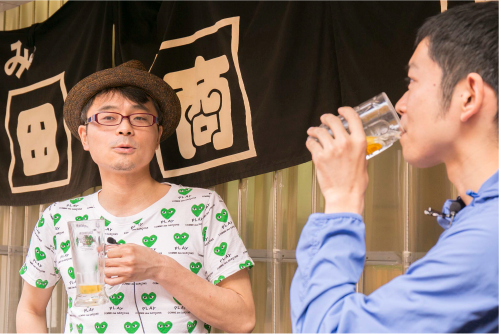
Fujiwara : Recently, I took a class called "Ape Theater Theory" by Hideyoshi Ko, where he talked about the "role of theater in ancient Greece," which I think is very similar to what you just said about media. For example, they would show Athenian citizens a play with a theme like "We're being attacked by Sparta, what will you do?", or they would explain the ethics of incest, and after watching it, everyone would discuss it. It's truly media.
Nejiko : I think it's related to that, but I actually went to Korea to see the Miryang Arirang Festival. I heard that I could see a demonstration of a traditional event called Miryang Baekjungnori there, so I went to see the demonstration instead of the main festival. The ending of the Miryang Arirang Festival is a spectacular multimedia show that combines the mist blowing out of the river, the mountainside at the back of the river, and the temple at the top of the mountain, which is lit up, with laser lighting. Along with the laser lighting, there is a skit about the Korean people who were oppressed by the Japanese military during the colonial period being saved by the Miryang vigilante group. Of course, Japanese soldiers also appear, and there is a long scene where they shoot and kill local residents.
When I saw it, I thought it was a kind of propaganda play at first, but when I returned to Fukuoka and talked about it with my friend Natsuko Tezuka, we started talking about "healthy nationalism and unhealthy nationalism." In that sense, Korea is healthy and Japan is unhealthy, and I thought that made sense. As with Greek theater, they are going through a process of digesting the horrific history they fell into in the past by making it into a play and watching it over and over again. So it's not propaganda at all. It's also connected to the fact that theater itself is a medium, but watching such plays properly is not anti-Japanese education, but rather a necessary process in which theater is still required today. On the other hand, Japan is good at not watching them or saying "it's okay" and resetting every year. To put it very simply, in the case of Korea and Greece, theater is a mechanism for people to see things they don't want to see.
Fujiwara : In that sense, the works that Chelfitsch's Okada has been working on recently may be ones that are quite conscious of this. "How do you show people things they don't want to see?"
Nejiko : I wonder if we should do this process in Japan too. But I don't think anyone would watch it... Somehow, Japan's laissez-faire attitude is somewhat Latin (laughs). It's like they just dismiss everything as "so-so."
Fujiwara : I wonder where that came from. I feel like the feeling of "not wanting to see it" must have come from after the war...
Nejiko : Japanese people are good at making things move without anyone making the decisions.
Fujiwara : That story is probably older. For example, the story of the elders of Tsushima in "The Forgotten Japanese" (by Tsuneichi Miyamoto) is exactly like that. They are supposed to be discussing a certain topic, but instead of a debate, they just talk endlessly about their memories, like "This happened a long time ago...", and before you know it, they have reached a conclusion.
Nejiko : There are a lot of things Japanese people aren't suited to, like debate and democracy.
Fujiwara : In fact, you could say that with the arrival of global capitalism, we are being forced to develop our economies as a nation, and that we have to be good at debating. But even if I say that the "no particular decisions" feeling is one of Japan's strengths, it also feels like we've been forced into a society where things don't move forward unless decisions are made at a certain speed. By the way, when I was returning from Manila, an American asked me how to say "I miss you" in Japanese, and after thinking for a while I answered, "No, there isn't." Is there such a thing?
Nejiko : Hmm...
Fujiwara : It's a famous story that Natsume Soseki translated "I love you" to "The moon is beautiful, isn't it?" If "I miss you" was an archaic Japanese phrase, I think it would have been conveyed through waka poetry. So at the very least, five-seven-five is necessary, and if possible, five-seven-five-seven-seven would be even better (laughs).
Nejiko : It's long (laughs) It's long and I can't understand what you're saying, so why not just say "I miss you"?
Fujiwara : (laughs) If we are a people who need 5-7-5-7-7 to express our feelings, then we will be left behind in the world of global international competitiveness and so on. But still, we don't want to say "I miss you" so easily.
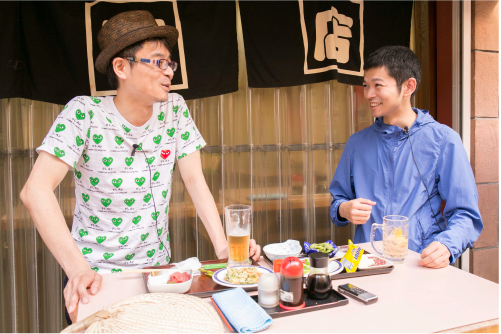
Encounter with Butoh
Fujiwara : Changing the subject, I read your interview about how you first encountered Butoh and joined Dairakudakan up to the present day, and it sounds like a rolling stone (laughs).
Nejiko : lol
This also links to the media, but for example, in Noh, I think there is a sense that it is not "the dance of this Noh actor," but rather that a certain performing art that has been handed down unbroken up until that point is written on the body of the Noh actor. In the same way, it is not me, but rather "this performing art is written on my body," and that the body is the medium. In the Miryang Baekjung Nori, there is a piece called Byeongshinchum (Dance of the Sick Body), in which a 96-year-old grandmother who cannot walk by herself is carried on someone's back and comes out, dances hopping around for a few minutes, and then leaves. That was really good. As you get older, rather than being a dancer, you see the person's history, the performing arts they perform, and the time they have spent all written on their body. So they are dancers, but it's not what a dancer is doing, in other words, it's the feeling that it's "not me." That feeling is really good for me. The first person that comes to mind is Kazuo Ohno. Ohno's ego is overwritten on his body. So there is a sense that it is Kazuo Ohno who is doing it, but not Kazuo Ohno. I'm sure there's a feeling you can get when you reach that level, so I'd like to live long enough to reach that level.
Fujiwara : I see. I think that's because you jumped right into the core of butoh right from the start. You could say that Dairakudakan had already become quite historic by the time you joined in 2000, so perhaps you felt that you could touch the history of physical expression through Dairakudakan.
Nejiko : That may be true. When talking about Butoh technique, the key is how to create a system that allows you to move in a way that is not your own. To put it simply, it would be "your right hand rises" instead of "raising your right hand," "your body is placed" instead of "standing," "your feet move" instead of "walking," and so on. These are just rephrases, but they make a difference. How to put yourself in a state that is "not me" in this way is a technique, and I think it is a characteristic of Butoh. So that must be what is influencing it.
Fujiwara : Why do you think Nejiko fit in there in the first place?
Nejiko : I wonder why...
I went to see Dairakudakan's performance and wrote and sent my resume that very same day. I think there must have been something deeper to it, but at the time it didn't matter, it was just cosplay for me. I simply wanted to be that person!
Fujiwara : Like, "This is it!"
Nejiko : Yeah (laughs) So, it's cosplay. That's for sure.
Fujiwara : Oh, can I have a lemon sour, please?
Nejiko : I'll have a beer then. Oh, and the rice bowl curry was 100 yen. I want to try that too!
I want dance to be something trivial.
Nejiko : This ties in a little with what I said earlier about theater in Greece and Korea, but I think that I've always had a deep-seated quality, or maybe a habit, of wanting to show even the unpleasant things.
There's one episode...
One day, I was sitting in a priority seat on the train. I'm the type of person who will give up my seat if someone in front of me needs it, and will sit in a priority seat if it's available, but that day the train was empty, so I was sitting there reading a paperback book. The train started to get crowded, but I was so focused on my paperback book that I didn't notice. Then I heard someone say "Hey!", and I quickly looked ahead, and there was an elderly lady standing right in front of me. Next to her was a woman in her late 40s, who said, "Hey, this is a priority seat." So I said, "Oh, sorry," and of course I gave up my seat, but what do you think I did at that moment?
Fujiwara : Hmm... I don't know... Maybe a click of the tongue?
Nejiko : Hmm, maybe it's close. I didn't do it because I wanted to, I just did it and I was surprised myself... That's what happened, but at that time I acted with a bad leg.
Fujiwara : Ah...
Nejiko : I think I have this kind of desire inside me, and it shows up in my work quite a bit. It's like a habit, though. I talk about my sense of mission and create works in various countries, but I was depressed when I realized that at the root of my creation is this kind of feeling. But I gave up, even though I was depressed (laughs).
Fujiwara : Like that's who you are?
Nejiko : Exactly. So what I want to say is that when I go to see someone's work and am impressed, that's the part of the creator... I'm really moved by that. I can't really explain it, but recently I've been calling those kinds of things "useless." It's precisely because they're "useless" that they don't get used. But "useless" isn't a very good word, so I need to invent a better one.
Fujiwara : ``It's useless'', right?
Nejiko : Right. I'd like to continue on from that and talk about dance, but first, going back to the Miryang Arirang Festival, in the final scene of the skit in the multimedia show, a huge Korean flag is projected onto the surface of the river and the mountains, and everyone sings Miryang Arirang together. Up until that point, it's all about nationalism, but at the end, everyone starts dancing, using it as a joke. When I saw it, middle-aged women jumped onto the stage and started doing the okgaechum (shoulder dance) on their own.
Fujiwara : Wow!!!
Nejiko : The Okkechum at that time wasn't nationalistic, I think it was just a kind of vibe, but I feel that dance should deal with such "unused" things.
Fujiwara : Yes.
Nejiko : Even nationalism is now nothing more than a chant. It's a trivial thing, but I want dance to be like that.
This is where the curry came in.

Fujiwara : Wow! That's amazing! It's like homemade curry.
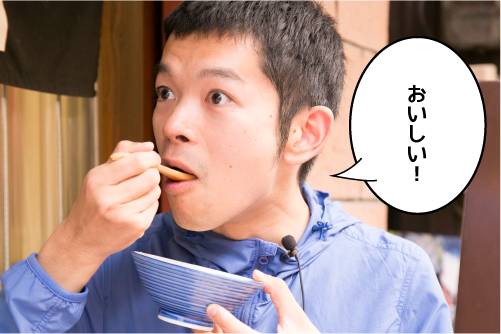
the next deployment
Fujiwara : By the way, you're going to perform a new work at the Red Brick Warehouse soon, right?
Nejiko : That's right. Since I'm the organizer this time, I've been thinking about a lot of things. What I find amusing is something that happens unexpectedly, something like an accident, but I think that out of 300 people who watch it, only 10 people will find it funny. However, those 10 people might be so shocked that they go home crying (laughs).
Fujiwara : It really hits home, like that (laughs).
Nejiko : Exactly (laughs). But then everyone else doesn't know what happened. I don't want that to happen.
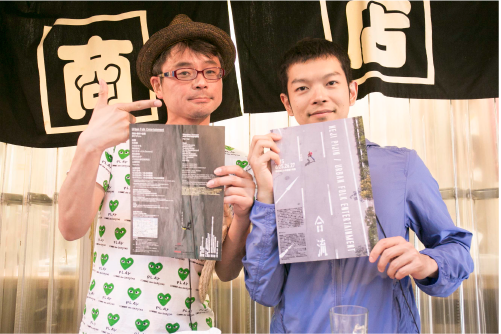
NEJI PIJIN / URBAN FOLK ENTERTAINMENT
<This event has ended.>
Date: June 25th (Thurs), 26th (Fri), 27th (Sat)
Venue: Yokohama Red Brick Warehouse No.1
*Please see related events for details.
Nejiko : Also, one of the things I'm interested in now is to think about what kind of situation is necessary for dance to be formed outside of the relationship of seeing and being seen, and to actually do that. I think that the relationship of people looking at each other is theater, and I think that's a great thing. But dance is not that relationship itself. Until now, I've been dealing with the physical reaction that arises from that relationship. If I were to continue dealing with dance in this way, somewhere there is a desire to get away from that relationship. I feel like there is a sense that dance doesn't need to be watched by someone. So, to give an easy-to-understand example, I want to actually do and invent something like walking into the eye of a typhoon and getting your whole body caught up in it. Moreover, I think it's good to share it with several people, not just do it alone. For example, we could all get the flu and have a 40 degree fever, and share our physical condition at that time.
Fujiwara : It's dangerous... But when you catch a cold, you strangely become more aware of your body.
Nejiko : Yes, it really feels like I'm not me. I feel like I'm shivering with a high fever, which is hard, but it's fun (laughs).
Fujiwara : Whether you do it or not, it's an opportunity to be conscious of your daily behavior.
Nejiko : That's right. So, I'm looking to find people who are willing to join me in this kind of thing with the same enthusiasm as me, and once we've gathered, I'm thinking of continuing the project for a limited period of three years.
Fujiwara : Are you going to start a company?
Nejiko : Yes. I thought it might be good to get together with people like that and start a company. Right now I'm more interested in that than creating new works. That being said, I might suddenly feel like creating a new work, and that's fine too.
Fujiwara : Of course. But why is it limited to three years?
Nejiko : I guess working in a group is tough. It would be really awful if people gradually got worn out and had to quit.
Fujiwara : I'm really looking forward to that company.
Well, Nejiko is a rolling stone (laughs).
Nejiko : Haha. I hope there are no slopes.
Fujiwara : But the metaphor of a "rolling stone" generally means that as it rolls, the edges get smoothed out and it becomes rounded... but maybe that's not the case for you, Nejiko (laughs).
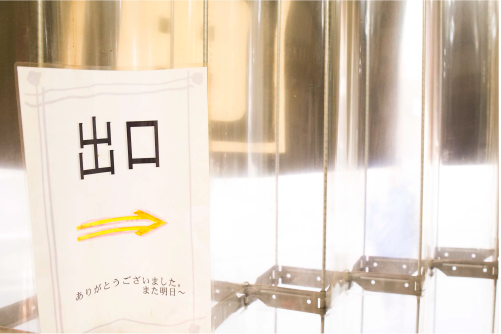
End
Here is the store information
Here is the food we had this time:

And today's recommendation is,

Meat and potatoes that are well flavored!
Standing bar Shimoda Shoten
1-6-4 Tsunashima Nishi, Kohoku Ward, Yokohama City, Kanagawa Prefecture
TEL : 045-593-6437
Business hours : 16:00-24:00 (last orders 23:30) *Open on Sundays
Access : 2 minutes walk from the west exit of Tsunashima Station on the Tokyu Toyoko Line
